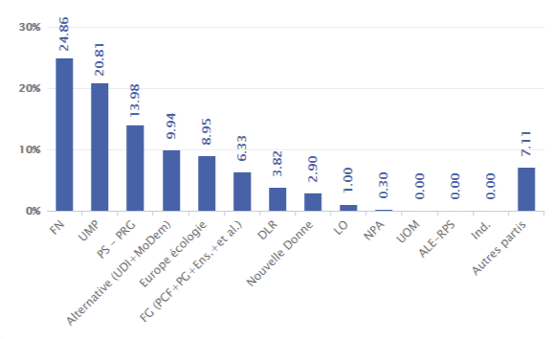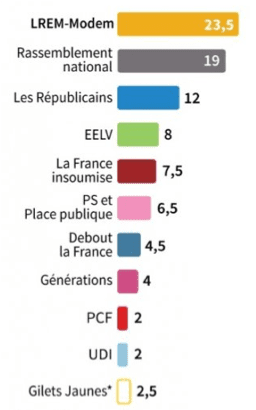With the French electorate losing faith in the country’s traditional parties (referring mainly to the Parti Socialiste and Les Républicains), French influence within the European Parliament could be set to take a significant blow following May’s European elections. When more MEPs in the main pan-European groups (EPP and S&D) generally means more top jobs, the fragmentation of the French vote could see the delegation of one of Europe’s founding fathers’ play a bit part role in the next legislature.
The fall of the traditional parties
The Socialists are perhaps those who will suffer the most come May. Currently with 13 MEPs as part of the S&D group, French socialists represent a sizable portion of the 133 total S&D MEPs. The latest polls suggest however that this number may fall to a mere 5 MEPs. Worryingly for the Socialists, they are teetering just above the 5% threshold needed to be able to send members to the European Parliament, an unpopularity level at an all-time low for a party which has been instrumental in the creation of the European Union as we know it today. Weakened by the difficulties of the Francois Hollande Presidency (the most unpopular French President of all time) and the defection of a number of adherents (including former Socialist Party candidate Benoit Hamon who has decided to create his own party known as Génération.s.), the Socialists have been soul-searching for a new voice in an increasingly fragmented leftist vote. Jean-Luc Melenchon’s France Insoumise has perhaps benefitted the most from this disintegration, but so has President Macron’s LREM Party (who lest we forget was a former Finance Minister under Hollande). To prevent a catastrophic scenario, the Socialists have formed an electoral pact with Place Publique, a centre-left party launched in late 2018, which has secured them vital breathing space, bringing them up to around 6.5%.
The Socialists are not the only ones in disorder. On the conservative-right, Les Républicains, are set to secure around 12 seats at the elections in May, a net loss of 8 seats compared to 2014. Squeezed between Macron’s LREM and Marine Le Pen’s Rassemblement National (the expected two main French political forces), a significant portion of the Les Républicains electoral base has looked elsewhere. This has also been reflected in the movement of ex-members of the party who have rallied to the President’s party such as former Prime Minister under Jacques Chirac, Jean-Pierre Raffarin.
In an effort to regain support, Les Républicains have turned slightly further to the right under the leadership of Laurent Wauquiez, to echo some of the rhetoric on immigration that has led to strong results for the nationalist far-right. Nevertheless, the party remains pro-European. With the European elections on the horizon, the party has named the young Catholic conservative François-Xavier Bellamy to head its party list. So far, this strategy seems to have worked with polls projecting a slight increase in voting intentions for the party. However, still a distant third and way behind levels that they have enjoyed in previous elections, Les Républicains will most probably be a weakened force in the composition of the new European Parliament.
 Figure 1: 2014 European Election Results in France (Source: European Parliament)
Figure 1: 2014 European Election Results in France (Source: European Parliament)
 Figure 2: 2019 European Election Voting Intentions (Source: Isop)
Figure 2: 2019 European Election Voting Intentions (Source: Isop)
The influence of the main pan-European groups
The institutional framework of the European Parliament usually means that the largest political groups possess higher levels of influence. A large national delegation in one of these transnational parties (traditionally the S&D and the EPP) gives MEPs significant weight to shape party positions and subsequent voting. For instance, in the past this has allowed France to bring airline passenger records and the removal of online terror content to the fore of the legislative agenda.
Equally, being a large delegation in one of the major European parties allows for more coveted roles such as committee chairs and policy coordinator roles. Policy coordinators act as spokespeople for their party in the European Parliament committees. The French socialists currently have two policy coordinators, Pervenche Bérès in the Economic Affairs Committee, and Virginie Rozière in the Petitions Committee. With the former definitely on the way out and the latter’s fate still unclear, the French socialist delegation might suffer from the loss of two well-respected figures in Brussels.
On the side of Les Républicains, policy coordinator for the Women’s Rights and Gender Equality Committee Constance Le Grip is absent from the list for 2019, whereas Fisheries Committee Chair Alain Cadec finds himself 13th, making his election for a third mandate hang in the balance.
What are the consequences?
For France, a diminished role in the European Parliament will likely have a few unwanted fallouts. Firstly, many have claimed that the exit of many big-hitting French MEPs would mean that French pro-EU members would suffer from a loss of media coverage. As a result, messages conveying what good the European Parliament does for French citizens would be largely inaudible in France, giving way for more extremist parties to rise. Although the LREM with its Europhile position is predicted to recover a significant proportion of these lost seats, it will probably not be part of one of the main pan-European political groups. Additionally, most of its MEPs would be inexperienced, making it more difficult for them to be able to claim some of the Parliament’s most senior posts.
Furthermore, there is a risk of a sizable imbalance in the Franco-German relationship at the heart of the European Union., jeopardizing France’s ability to influence their German counterparts in the large pan-European political groups. Therefore, the push that Macron is giving to further European integration, it seems, will largely bypass his compatriots in the European Parliament. France will probably have to utilize other channels to influence decision-making in Brussels elsewhere.